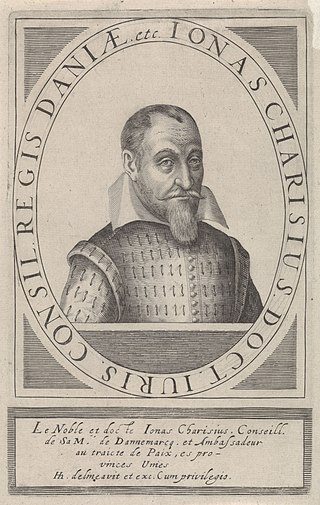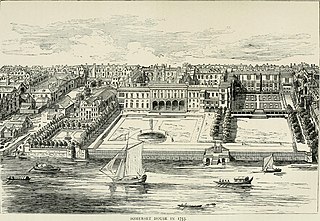Related Research Articles

Sir Walter Mildmay was a statesman who served as Chancellor of the Exchequer to Queen Elizabeth I, and founded Emmanuel College, Cambridge.

William Blathwayt was an English diplomat, public official and Whig politician who sat in the English and British House of Commons between 1685 and 1710. He established the War Office as a department of the British Government and played an important part in administering the English colonies of North America.

Lionel Cranfield, 1st Earl of Middlesex was an English merchant and politician. He sat in the House of Commons between 1614 and 1622 when he was raised to the peerage as Baron Cranfield.

John Manners, 8th Earl of Rutland, was an English politician who sat in the House of Commons from 1640 until 1641 when he inherited the title Earl of Rutland on the death of his second cousin George Manners, 7th Earl of Rutland.

The Court of Wards and Liveries was a court established during the reign of Henry VIII in England. Its purpose was to administer a system of feudal dues; but as well as the revenue collection, the court was also responsible for wardship and livery issues.
Thomas Povey FRS, was a London merchant-politician. He was active in colonial affairs from the 1650s, but neutral enough in his politics to be named a member from 1660 of Charles II's Council for Foreign Plantations. A powerful figure in the not-yet professionalised First English Empire, he was both "England's first colonial civil servant" and at the same time "a typical office holder of the Restoration". Both Samuel Pepys and William Berkeley, Governor of Virginia, railed at times against Povey's incompetence and maladministration.
Sir William Herrick or Hericke was an English jeweller, courtier, diplomat and politician who sat in the House of Commons at various times between 1601 and 1622.
Sir John Povey (1621–1679) was an English-born judge who had a highly successful career in Ireland, holding office as Baron of the Court of Exchequer (Ireland) and subsequently as Lord Chief Justice of Ireland during the years 1673–9.
Sir James Fullerton or Fullarton was a Scottish courtier and politician during the reigns of James I of England and Charles I.
Sir William Cornwallis of Brome was an English courtier and politician.
John Murray, 1st Earl of Annandale was a Scottish courtier and Member of Parliament.
Barbara Ruthven was a Scottish courtier and favourite of Anne of Denmark, expelled from court after the death of her brother.
Sir Francis Gofton was an English courtier and administrator. He was an auditor of royal accounts and jewels, Chief Auditor of the Imprest from 1597 and Auditor of Mint from August 1603. Gofton acquired the manor of Heathrow, and houses in Stockwell and West Ham. He was often called "Auditor Gofton". The surname is frequently transcribed as "Goston" or "Guston"

John Williams was a Welsh-born goldsmith based in London who worked for the royal family.

Philip Jacobson was a London goldsmith who worked for James VI and I and Anne of Denmark.

Jonas Charisius or Carisius (1571-1619) was a Danish physician, politician, and ambassador.

Edward Cary or Carey or Carye was an English courtier and Master of the Jewel Office for Elizabeth I and James VI and I.

Ralph Ewens of South Cowton (1569–1611) was an English administrator and Member of Parliament.
References
- ↑ John Guillim, A Display of Heraldry (London, 1724), p. 138.
- ↑ ANGELL, John (1592-1670), of Old Fish Street, Billingsgate, London and Crowhurst, Surrey, Published in The History of Parliament: the House of Commons 1604-1629, ed. Andrew Thrush and John P. Ferris, 2010.
- ↑ Madeleine Gray, "An Early Professional Group? The Auditors of Land Revenue in the Late Sixteenth and Early Seventeenth Centuries", Archives: The Journal of the British Records Association, 20:87 (January 1992), p. 45. doi : 10.3828/archives.1992.5
- ↑ Helen Wilcox, 1611: Authority, Gender and the Word in Early Modern England (Wiley, 2014), 112: Madeleine Gray, 'Exchequer officials and Crown property', Richard W. Hoyle, The Estates of the English Crown, 1558-1640 (Cambridge, 1992), 45, 123, 126–128.
- ↑ Daniel Packer, 'Jewels of 'Blacknesse' at the Jacobean Court', Journal of the Warburg and Courtauld Institutes, vol. 75 (2012), p. 201 fn.1.
- ↑ See a household list of 1619, BNF MS Français 15990
- ↑ N. R. R. Fisher, 'The Queenes Courte in Her Councell Chamber at Westminster', The English Historical Review, 108:427 (April 1993), 315: Calendar of State Papers Domestic, 1641–1643 (London, 1887), 118–19.
- ↑ Madeleine Gray, 'Exchequer officials and Crown property', Richard W. Hoyle, The Estates of the English Crown, 1558-1640 (Cambridge, 1992), 133.
- ↑ Walter Charles Metcalfe, The Visitations of Essex, part 2 (London, 1879), p. 603.
- ↑ Joseph Lemuel Chester, London Marriage Licences, 1521-1869 (London, 1887), p. 139.